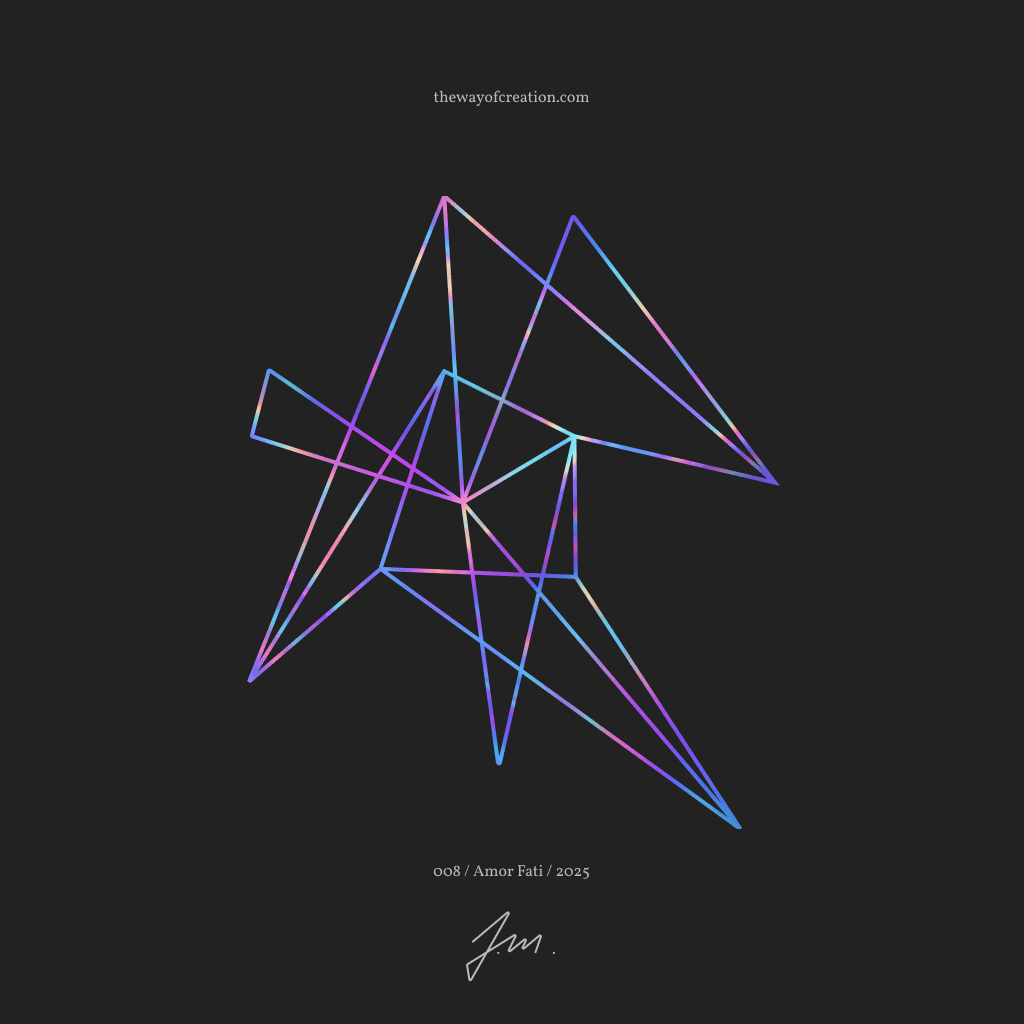Amor Fati – Love Your Fate.
On The Way of Creation, we speak of surrender. Of letting go. Of living and creating not from fear or control, but from trust – from love. In that spirit, there is an ancient idea, a quietly radical practice, that can deepen our journey even further.
It is called Amor Fati.
Amor Fati – the love of fate.
Not merely accepting what happens. Not tolerating or enduring it.
But loving it. Actively, wholeheartedly, courageously loving it.
At first, this may sound almost impossible. How can we love our heartbreaks? Our losses? Our failures? How can we love not only the moments of beauty, but also the dark nights of the soul?
And yet, this is precisely what Amor Fati invites us into:
A deeper surrender.
A radical acceptance.
A tender love for the entirety of life – not just for the parts we wanted, but for the whole of it.
The Wisdom of the Stoics.
The ancient Stoic philosophers, like Marcus Aurelius, Seneca, and Epictetus, lived close to this idea. To them, life itself was neither good nor bad – it simply was. Our judgments, our resistance, our preferences created suffering. But if we could learn to align with nature, with the divine order of things, we could find peace in any circumstance.
Marcus Aurelius wrote in his Meditations:
Life throws joys and tragedies alike into our fire. Amor Fati means making something luminous out of all of it. Even the difficult, even the painful.
The Stoics did not deny pain. They simply refused to let it be meaningless. They trusted that every event could be used – to grow in wisdom, in courage, in compassion.
Nietzsche and the Embrace of Destiny.
Centuries later, Friedrich Nietzsche picked up this ancient thread and wove it even deeper. To him, Amor Fati was not just a wise coping strategy – it was a profound creative act. A way of saying "yes" to existence with all its shadows and contradictions. A way of affirming life itself, fiercely and joyfully.
Nietzsche wrote:
To love our fate, not despite its hardships, but because of them – this is not passivity. It is the most active, most courageous way of being. It means seeing every moment – even the ones that break us – as necessary, as belonging, as worthy of love.
It is a creative stance toward life: an ongoing act of acceptance, transformation, and even celebration.
Meister Eckhart and the Deep Surrender.
In the Christian mystical tradition, Meister Eckhart spoke similarly of surrender and love. His teachings resonate deeply with the heart of Amor Fati, though he used different words.
He said:
Eckhart taught that the soul must become empty – free of attachments, expectations, and fears – so that the divine could flow through it. True union with life, or with God, meant letting go of personal will, and embracing everything as coming from the Source.
In that emptiness, in that letting-go, a new kind of fullness was born – a radical acceptance, a profound joy, a union with the very life-force itself.
Amor Fati on The Way of Creation.
And so – how does this ancient practice of Amor Fati weave into our journey here, on the Way of Creation?
At its heart, Amor Fati is an invitation to trust life more deeply than we ever thought possible.
When we create – when we dare to bring something real into the world – we open ourselves to both inspiration and imperfection, to beauty and to disappointment. Creation is not perfect or predictable. It is wild, vulnerable, living.
If we only create when we feel safe, when we feel certain of success, we limit ourselves – and our love.
But if we dare to love the entire process – the flashes of brilliance and the aching doubts, the victories and the failures – we are practicing Amor Fati.
When we let go of needing every step to be easy or understood, when we embrace even the unexpected twists as part of the unfolding – we are practicing Amor Fati.
When we recognize that even our struggles, our delays, our heartbreaks, are not detours but part of the sacred journey of becoming – we are living Amor Fati.
Amor Fati transforms the way we walk the path.
It shifts the question from:
"How can I avoid pain, disappointment, and uncertainty?"
to:
"How can I love even this?"
It's not about denying sadness or difficulty. It's about embracing them as belonging. It's about trusting that somehow, mysteriously, everything – even the painful parts – is part of what shapes us, deepens us, and brings forth the soul's most profound creations.
A Gentle Invitation.
Amor Fati asks us to soften.
To breathe.
To stop fighting life at every turn.
It invites us to meet every moment – even the unwanted ones – with curiosity, with tenderness, with love.
Not because everything is easy.
But because everything is real.
Because everything belongs.
This is the Way of Creation.
Not the way of striving, controlling, or perfecting.
But the way of surrendering, trusting, and loving.
The way of creating with life, not against it.
The way of letting ourselves be touched, shaped, transformed – and, through that transformation, offering our deepest truth back to the world.
Closing Reflection.
So today, dear traveler,
maybe you can place a hand on your heart,
breathe in the life that is here, exactly as it is,
and whisper quietly to yourself:
"I love it all. Even this."
Amor Fati.

